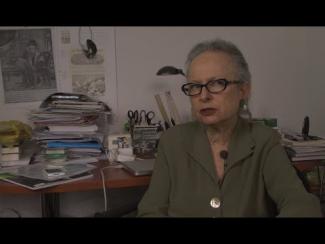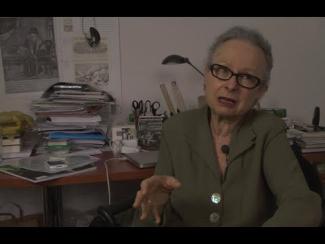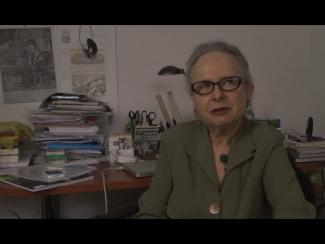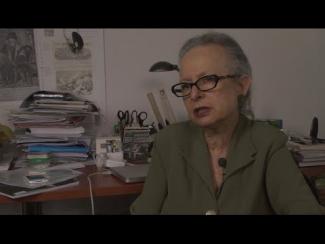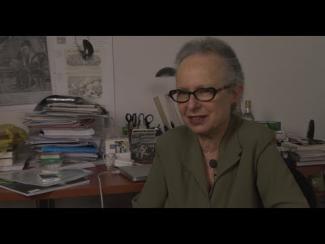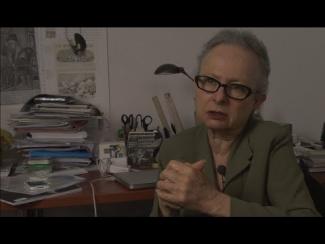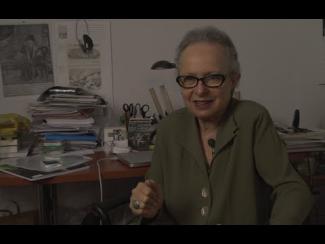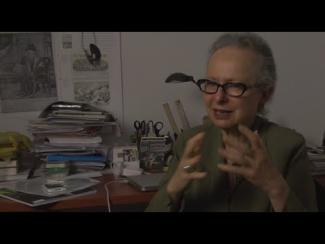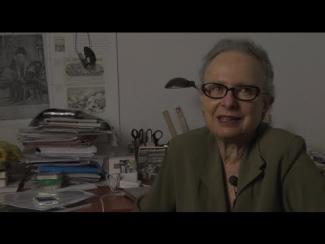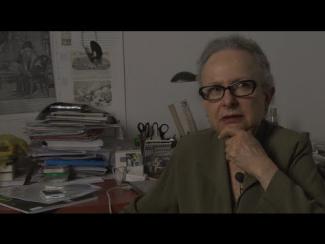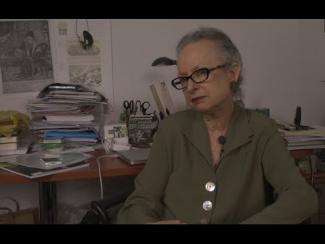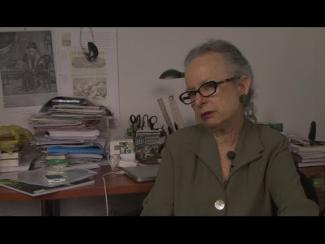The Yiddish Book Center's
Wexler Oral History Project
A growing collection of in-depth interviews with people of all ages and backgrounds, whose stories about the legacy and changing nature of Yiddish language and culture offer a rich and complex chronicle of Jewish identity.
Barbara Kirshenblatt-Gimblett's Oral History
Barbara Kirshenblatt Gimblett, director of the core exhibition at the Museum of the History of Polish Jews in Warsaw, was interviewed by Christa Whitney on May 7, 2013 in Warsaw, Poland. Both Barbara's parents were born in Poland. They left before World War II and settled in Canada. Barbara was born and raised in a very Jewish immigrant neighborhood in Toronto. Her father owned a paint and wallpaper store. Barbara heard primarily English, Yiddish, and Polish in the home. She attended the Farband and then the Peretz shules and describes the houses she grew up in – all her uncles and their families lived in close proximity in the city and then in the suburbs. Barbara visited Poland for the first time in 1981. She had been working at YIVO cataloguing a collection of 15,000 photographs and helping to produce an exhibition and a book. She describes Poland under Communism as grey, austere, and paranoid. She met and befriended several Jewish activists in the movement to renew Jewish life in Poland. In graduate school Barbara began interviewing her parents, relatives, friends, and neighbors. She became very interested in Yiddish and Eastern European history and culture and was hired to conduct a survey of Yiddish folklore among Jewish immigrants in Toronto. She was brought to YIVO to research this topic and was excited to take and teach classes and meet scholars and researchers with similar interests. She wrote her doctoral dissertation on traditional storytelling in the Toronto Jewish community. She describes various academic jobs on the way to ending up at New York University, doing research at YIVO and teaching courses at Columbia University. YIVO's focus on folklore has been important at that institution since its inception. She talks about the "genius of a people" and the contributions of ordinary folks to a culture also influenced by individual artists, writers, and others. Barbara talks about the yet to be opened Pollin Museum, its vision and mission. She was enlisted early on to help with the master plan. She describes the unique public-private partnership that was developed, the international architectural competition to design the building, and her role as the program director of the core exhibition, a multimedia narrative exhibition that tells the story of a thousand years of Jewish life in Poland. She talks about the extraordinary team working with her on this huge project. Barbara highlights the sensitivities inherent in creating an exhibition focusing on the long history of Polish Jewry without minimizing the cataclysmic effect of the Holocaust. She acknowledges but rebuts some of the angry response to the museum's conceptual framework from some Jewish sources, who consider Poland a "cesspool of antisemitism" and suspect the Poles' motivations. She explains how Yiddish will be fully and beautifully represented in the exhibition. Barbara talks about how she became a Polish citizen and the joyous party that her Polish colleagues organized to celebrate that event. She brought her parents on several trips which culminated in an exhibit of large prints of her father's paintings in his hometown Opataw and a mass in commemoration of the day that the Jews were rounded up and sent to Treblinka. Barbara considers her father an "extraordinary ordinary person" and expresses her belief in the creativity of ordinary people who receive support and encouragement. Barbara hopes that the museum will support the beginnings of renewal of Jewish life in Poland and provide a legacy to young Poles who are searching for their heritage and previously had nowhere to learn about the Jewish world that was here. She hopes too that it will provide Jews around the world with a sense of continuity. Barbara is not sure what is ahead for her but knows that she wants to write. She advises future visitors to the museum to allow at least a day or two to visit so that they can have a deep, meaningful experience.
This interview was conducted in English.
Barbara Kirshenblatt-Gimblett was born in Toronto, Ontario, Canada in 1942.

